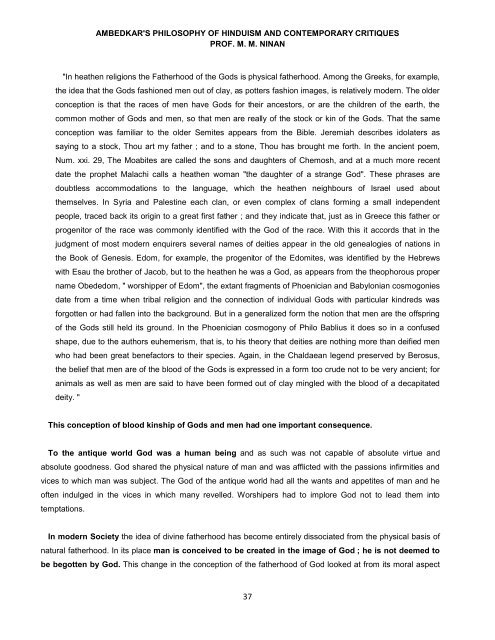Ambedkar-Philosophy of Hinduism
You also want an ePaper? Increase the reach of your titles
YUMPU automatically turns print PDFs into web optimized ePapers that Google loves.
AMBEDKAR'S PHILOSOPHY OF HINDUISM AND CONTEMPORARY CRITIQUES<br />
PROF. M. M. NINAN<br />
"In heathen religions the Fatherhood <strong>of</strong> the Gods is physical fatherhood. Among the Greeks, for example,<br />
the idea that the Gods fashioned men out <strong>of</strong> clay, as potters fashion images, is relatively modern. The older<br />
conception is that the races <strong>of</strong> men have Gods for their ancestors, or are the children <strong>of</strong> the earth, the<br />
common mother <strong>of</strong> Gods and men, so that men are really <strong>of</strong> the stock or kin <strong>of</strong> the Gods. That the same<br />
conception was familiar to the older Semites appears from the Bible. Jeremiah describes idolaters as<br />
saying to a stock, Thou art my father ; and to a stone, Thou has brought me forth. In the ancient poem,<br />
Num. xxi. 29, The Moabites are called the sons and daughters <strong>of</strong> Chemosh, and at a much more recent<br />
date the prophet Malachi calls a heathen woman "the daughter <strong>of</strong> a strange God". These phrases are<br />
doubtless accommodations to the language, which the heathen neighbours <strong>of</strong> Israel used about<br />
themselves. In Syria and Palestine each clan, or even complex <strong>of</strong> clans forming a small independent<br />
people, traced back its origin to a great first father ; and they indicate that, just as in Greece this father or<br />
progenitor <strong>of</strong> the race was commonly identified with the God <strong>of</strong> the race. With this it accords that in the<br />
judgment <strong>of</strong> most modern enquirers several names <strong>of</strong> deities appear in the old genealogies <strong>of</strong> nations in<br />
the Book <strong>of</strong> Genesis. Edom, for example, the progenitor <strong>of</strong> the Edomites, was identified by the Hebrews<br />
with Esau the brother <strong>of</strong> Jacob, but to the heathen he was a God, as appears from the theophorous proper<br />
name Obededom, " worshipper <strong>of</strong> Edom", the extant fragments <strong>of</strong> Phoenician and Babylonian cosmogonies<br />
date from a time when tribal religion and the connection <strong>of</strong> individual Gods with particular kindreds was<br />
forgotten or had fallen into the background. But in a generalized form the notion that men are the <strong>of</strong>fspring<br />
<strong>of</strong> the Gods still held its ground. In the Phoenician cosmogony <strong>of</strong> Philo Bablius it does so in a confused<br />
shape, due to the authors euhemerism, that is, to his theory that deities are nothing more than deified men<br />
who had been great benefactors to their species. Again, in the Chaldaean legend preserved by Berosus,<br />
the belief that men are <strong>of</strong> the blood <strong>of</strong> the Gods is expressed in a form too crude not to be very ancient; for<br />
animals as well as men are said to have been formed out <strong>of</strong> clay mingled with the blood <strong>of</strong> a decapitated<br />
deity. "<br />
This conception <strong>of</strong> blood kinship <strong>of</strong> Gods and men had one important consequence.<br />
To the antique world God was a human being and as such was not capable <strong>of</strong> absolute virtue and<br />
absolute goodness. God shared the physical nature <strong>of</strong> man and was afflicted with the passions infirmities and<br />
vices to which man was subject. The God <strong>of</strong> the antique world had all the wants and appetites <strong>of</strong> man and he<br />
<strong>of</strong>ten indulged in the vices in which many revelled. Worshipers had to implore God not to lead them into<br />
temptations.<br />
In modern Society the idea <strong>of</strong> divine fatherhood has become entirely dissociated from the physical basis <strong>of</strong><br />
natural fatherhood. In its place man is conceived to be created in the image <strong>of</strong> God ; he is not deemed to<br />
be begotten by God. This change in the conception <strong>of</strong> the fatherhood <strong>of</strong> God looked at from its moral aspect<br />
37


















